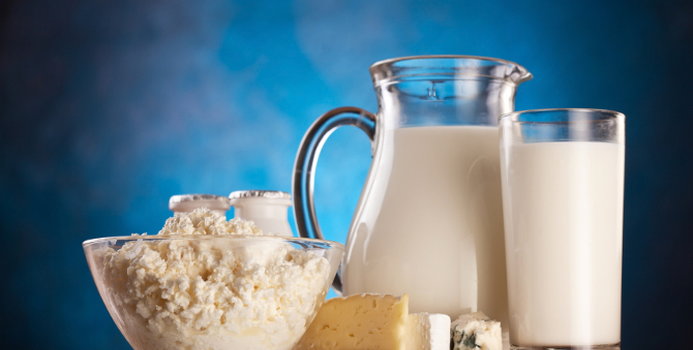Packed with essential nutrients but fairly low in calories, skim milk makes an excellent addition to heart-healthy meal plans. However, skim milk isn't for everybody. And, while low-fat milk products were once thought of as being heart-healthier than full-fat dairy foods, research doesn't necessarily support this claim.
Beneficial Nutrients
Skim milk is loaded with protein, calcium, phosphorous, vitamin D and vitamin A. Many of these nutrients help build and maintain strong muscles, teeth and bones. A cup of skim milk provides about 8 grams of protein, but just 90 calories. The protein in skim milk contains all essential amino acids your body needs daily, making skim milk a source of high-quality, complete protein. Protein also aids in healthy weight management because it boosts satiety and energy expenditure.
Health Benefits
Drinking skim milk regularly may provide you with several health benefits. You'll help decrease your risk for developing osteoporosis. A review published in 2013 in Obesity Reviews found that consuming whey protein, which is abundant in skim milk, helps lower your risk for obesity, maintain lean muscle mass, improve blood sugar levels, lower blood pressure, improve cholesterol levels, and appears to reduce your risk for developing heart disease.
Skim vs. Whole Milk
Skim milk is much lower in calories than whole milk -- containing 90 calories per cup vs. 150 calories in whole milk -- but provides about the same amount of protein, vitamins and minerals as whole milk. Whole milk contains saturated fat and dietary cholesterol, while skim milk provides just negligible amounts of these nutrients.
While ingesting large amounts of saturated fat does increase your risk for high cholesterol and heart disease, the saturated fat -- consisting of medium-chain triglycerides -- found in dairy fat may not be as bad as once thought. A review published in 2014 in Current Nutrition Reports found that full-fat dairy foods, including whole milk, yogurt and cheese, don't appear to increase heart-disease risks and may even help reduce your risk for developing heart disease.
Possible Disadvantages
While skim milk offers numerous health benefits, potential drawbacks exist as well. Because skim milk is often considered less flavorful than higher-fat milks, some people don't like the taste of skim milk. Furthermore, dietary fat -- which is lacking in skim milk -- helps fill you up and appears to regulate your appetite, according to the U.S. Library of Medicine. Skim milk may not be the best choice if you're lactose intolerant or have a milk allergy.

An experienced health, nutrition and fitness writer, Erin Coleman is a registered and licensed dietitian and holds a dietetics degree from the University of Wisconsin-Madison. She also has worked as a clinical dietitian and health educator in outpatient settings. Erin's work is published on popular health websites, such as TheNest.com and JillianMichaels.com.



